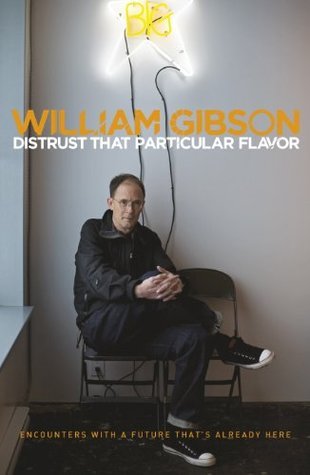What do you think?
Rate this book


Distrust That Particular Flavor - an acclaimed nonfiction collection by William Gibson, author of Neuromancer
'The future's already here: it's just not evenly distributed'
William Gibson was writing fiction when he predicted the internet. And as his stories bled into reality so he became one of the first to report on the real-world consequences of cyberspace's growth and development.
Now, with the dust settling on the first internet revolution, comes Gibson's first collection of non-fiction - essays from the technological and cultural frontiers of this new world.
Covering a variety of subjects, they include:
Metrophagy - the Art and Science of Digesting Great Cities
An account of obsession in 'the world's attic' - eBay
Reasons why 'The Net is a Waste of Time'
Singapore as 'Disneyland with the Death Penalty'
A primer on Japan, our default setting for the future
These and many other pieces, collected for the first time in Distrust that Particular Flavour, are studded with revealing autobiographical fragments and map the development of Gibson's acute perceptions about modern life. Readers of Neal Stephenson, Ray Bradbury and Iain M. Banks will love this book.
'Gibson is a prophet and a satirist, a black comedian and an astounding architect of cool. He's also responsible for much of the world we live in' Spectator
'Part-detective story, part-cultural snapshot ... all bound by Gibson's pin-sharp prose' Arena
William Gibson's first novel Neuromancer has sold more than six million copies worldwide. In an earlier story he had invented the term 'cyberspace'; a concept he developed in the novel, creating an iconography for the Information Age long before the invention of the Internet. The book won three major literary prizes. He has since written nine further novels including Count Zero; Mona Lisa Overdrive; The Difference Engine; Virtual Light; Idoru; All Tomorrow's Parties; Pattern Recognition; Spook Country and most recently Zero History.
217 pages, Kindle Edition
First published January 3, 2012
This perpetual toggling between nothing being new, under the sun, and everything having very recently changed, absolutely, is perhaps the central driving tension of my work.Gibson is very conscious of where he stands on this spectrum, which makes reading his work exciting.
Roppongi is an interzone, the land of gaijin bars, always up late. I’m waiting at a pedestrian crossing when I see her. She’s probably Australian, young and quite serviceably beautiful. She wears very expensive, very sheer black undergarments, and little else, save for some black outer layer—equally sheer, skintight, and micro-short—and some gold and diamonds to give potential clients the right idea. She steps past me, into four lanes of traffic, conversing on her phone in urgent Japanese. Traffic halts obediently for this triumphantly jaywalking gaijin in her black suede spikes. I watch her make the opposite curb, the brain-cancer deflector on her slender little phone swaying in counterpoint to her hips. When the light changes, I cross, and watch her high-five a bouncer who looks like Oddjob in a Paul Smith suit, his skinny lip beard razored with micrometer precision. There’s a flash of white as their palms meet. Folded paper. Junkie origami.
When we turn on the radio in a New York hotel room and hear Elvis singing "Heartbreak Hotel," we are seldom struck by the peculiarity of our situation: that a dead man sings.Or this one, from "Metrophagy":
In the context of the longer life of the species, it is something that only just changed a moment ago.
—p.52
Conspiracy theories and the occult comfort us because they present models of the world that more easily make sense than the world itself, and, regardless of how dark or threatening, are inherently less frightening.That latter insight explains so much...
—p.116